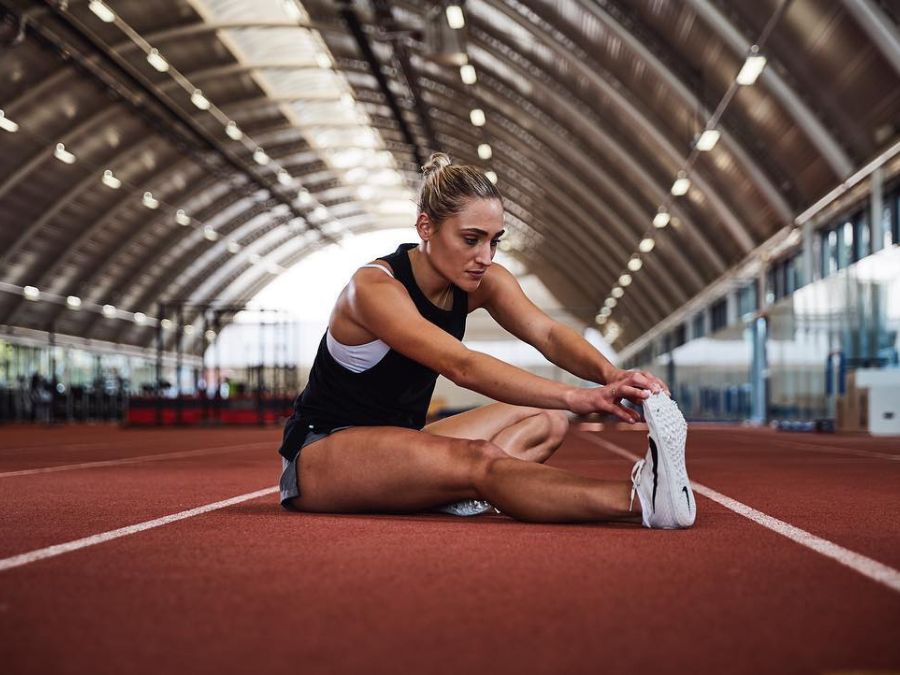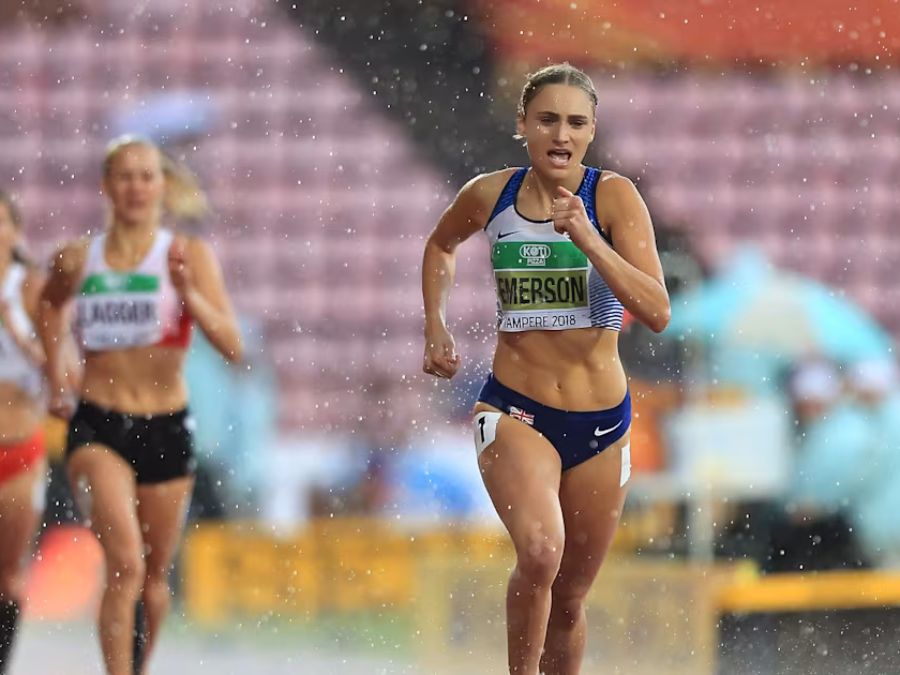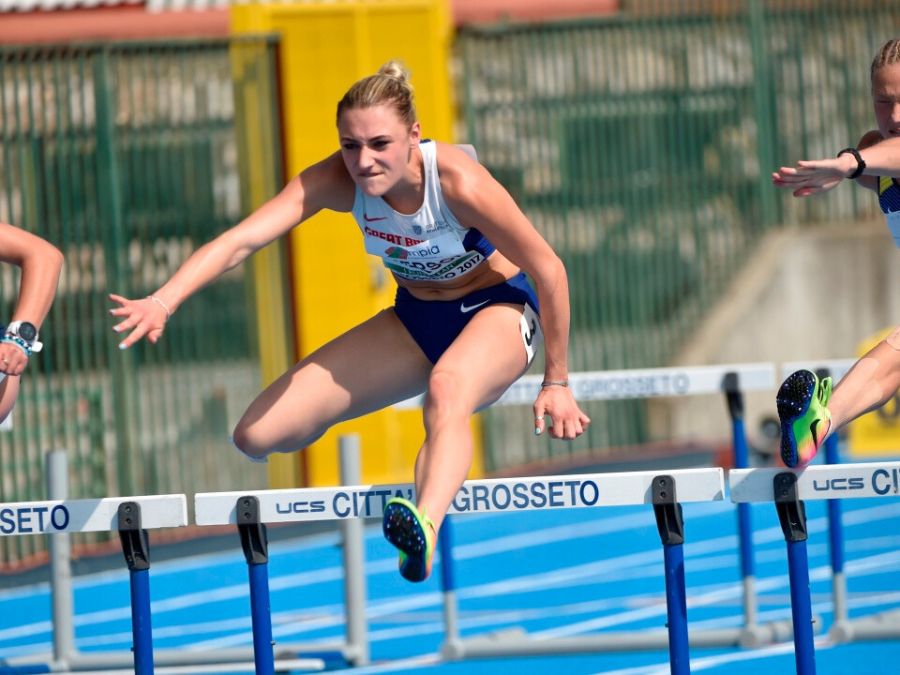In our RT Snap Q&A series, we’ve had the privilege of interviewing some of the world’s best runners, delving into their extraordinary journeys, celebrating their achievements, and exploring the unwavering dedication that defines their careers.
Niamh Emerson
- Born: April 22, 1999
- Nationality: Great Britain & N.I
- Pentathlon sh, Heptathlon, High Jump, Long Jump
Niamh Emerson’s running career has been an integral part of her success as a heptathlete, showcasing her strength and versatility on the track. In 2018, her talent shone brightly at the World U20 Championships in Tampere, Finland, where she claimed the gold medal in the heptathlon. Emerson’s standout performance in the 800m, the final event, was crucial to her victory, highlighting her ability to excel under pressure. This result positioned her as one of Britain’s most promising multi-event athletes and hinted at her potential for senior success.
In 2019, Emerson’s career took another step forward at the European Indoor Championships in Glasgow. Competing in the pentathlon, she displayed her grit and endurance in the 800m, clocking a strong time that secured her the bronze medal. Her 800m performances consistently set her apart in multi-events, as she often used the race to climb the rankings or consolidate her position. These achievements underscored her capability to compete against Europe’s best, solidifying her reputation as a well-rounded and resilient athlete.
Injury challenges in the latter part of 2019 slowed her momentum, but Emerson has continued to focus on her track events as part of her comeback. Her strong foundation in running remains a key weapon in her heptathlon arsenal, particularly in the grueling 800m, where her mental toughness shines. As she works toward a full return to form, Niamh Emerson’s running career remains central to her pursuit of success on the global stage. With her competitive drive and track skills, she is well-positioned to make a significant impact in future championships.
View this post on Instagram
Personal Bests
- Pentathlon Short Track – 4731
- Heptathlon – 6253
- High Jump – 1.89
- High Jump – 1.89
- Long Jump – 6.41
- 100 Metres Hurdles – 13.76
- 60 Metres Hurdles – 8.54
- 100 Metres Hurdles – 13.71
- 200 Metres – 24.16
- 200 Metres – 24.40
- 800 Metres – 2:09.74
- 400 Metres Hurdles – 1:01.07
- 800 Metres Short Track – 2:12.56
- 400 Metres – 60.06
- 400 Metres Short Track – 60.06
- Shot Put – 13.93
- 1500 Metres – 4:54.90
- Javelin Throw – 43.95
- 100 Metres Hurdles (76.2cm) – 14.17
- 300 Metres Hurdles – 44.08
- Shot Put (3kg) – 12.81
- Javelin Throw (500g) – 35.44
- Heptathlon U18 – 5919
- Pentathlon Girls Short Track – 3501
RT: What inspired you to pursue the heptathlon over other track and field events? Was there a specific moment or experience that made you decide to focus on the multi-discipline challenge of the heptathlon?
Niamh : I was a runner through and through—never saw myself as anything else. But I loved high jump and long jump. Watching the 2012 olympics in London everything changed for me. I watched Jess Ennis win Olympic gold, and instantly I wanted to be like her.

So, I started the pentathlon—the kids’ version of the heptathlon. Switching to multi events felt really natural and I had quick success. I just had to learn how to throw. Fast forward, and I’m still here chasing my own heptathlon dreams.
RT: Running is a key part of the heptathlon. How do you approach your running training for different events, like sprints versus middle-distance, and how do you tailor your sessions for each?
Niamh: We try to hit both ends of the running spectrum and meet in the middle. For speed, we do short, flat-out sprints with long recovery—like hill sprints in winter or 120m sprints in summer. For endurance, we focus on slower, longer runs or track reps with short recovery, such as grass tempo runs or 500m intervals. This balance helps build my strength and stamina for the heptathlon.

RT: Can you describe how you integrate strength and conditioning into your running training for the heptathlon? How does it help with both your sprinting and longer endurance events?
Niamh: Strength work is huge for us in the heptathlon—it’s all about power. We do a lot of gym sessions, and having that strength makes a big difference. Our S&C coach, Michael Johnston, works closely with our main coach, Aston Moore to tailor our programs. Strength training helps us generate more force, which translates to speed, and it also helps our muscles fatigue less during the endurance events. It’s essential for staying strong through all seven events.
RT: When you’re training for a major competition, how does your training change? Are there specific adjustments you make to your running sessions as the event approaches?
Niamh: It changes massively. The volume goes down, but the intensity ramps up. The closer we get to competing, the focus shifts to more race-specific efforts. Our running sessions become more time-trial-based. For example, since the heptathlon includes an 800m race, we’ll practice split 800s—running two reps of 400m at race pace. The week before a competition, we barely do anything; it’s all about sharpening up and saving energy for the two days of competition.
RT: You’ve faced many challenges throughout your career—can you share some of the toughest moments you’ve encountered, particularly with your running or multi-event training, and how you managed to overcome them?
Niamh:It’s been tough, but I got through it with an incredible support system. My family, friends, coaches, physios, and doctors have all played a huge role. They’ve helped me stay focused, positive, and determined, even during the hardest moments.
RT: How do you maintain mental focus and motivation throughout such a diverse training schedule? Do you have any strategies that help you stay sharp during the tough training blocks?
Niamh: Having a great, motivating training group is a huge help. Honestly, though, I really love training and athletics, so motivation isn’t usually an issue for me. Of course, when I’m tired, music and caffeine are absolute lifesavers!
RT: For someone looking to replicate your success in multi-event competitions, how would you recommend they approach their running training? What key areas should they focus on to build a solid foundation for success?
Niamh:Stay consistent with it. Cross-training can be a game-changer—I’ve done a lot of work on the bike and in the pool, and it’s really helped my overall fitness. Also, make sure to work on both your aerobic and anaerobic capacity. So be sure to run fast and work on your max speed. But remember to improve your endurance base with slow runs!















